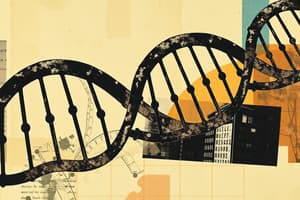Podcast
Questions and Answers
What is the primary role of DNA Polymerase during DNA replication?
What is the primary role of DNA Polymerase during DNA replication?
- Unwinds the DNA double helix
- Joins Okazaki fragments together
- Creates RNA primers
- Adds nucleotides and proofreads the growing DNA strand (correct)
Which of the following best describes the composition of a nucleotide?
Which of the following best describes the composition of a nucleotide?
- Two nitrogenous bases and a phospholipid
- A ribose sugar, a nitrogenous base, and an amino acid
- A deoxyribose sugar, a phosphate group, and a nitrogenous base (correct)
- A phosphate group, a ribosome, and a deoxyribose sugar
Which enzyme is responsible for creating RNA primers during DNA replication?
Which enzyme is responsible for creating RNA primers during DNA replication?
- DNA Polymerase
- Helicase
- Ligase
- Primase (correct)
What is the sequence of base pairing during the transcription process?
What is the sequence of base pairing during the transcription process?
In which location does translation occur to convert mRNA into a protein?
In which location does translation occur to convert mRNA into a protein?
Flashcards
DNA Backbone
DNA Backbone
The structural support of a DNA molecule, formed by alternating sugar and phosphate groups.
DNA Replication
DNA Replication
The process of copying DNA to create identical copies, crucial for cell division.
Helicase enzyme
Helicase enzyme
An enzyme that unwinds the DNA double helix during DNA replication.
Transcription
Transcription
Signup and view all the flashcards
Okazaki Fragment
Okazaki Fragment
Signup and view all the flashcards
Study Notes
DNA Structure and Replication
- DNA's backbone is formed by deoxyribose sugar and phosphate groups
- Nitrogen bases (adenine, thymine, cytosine, guanine) form the other half of the DNA structure
- Hydrogen bonds hold the two DNA strands together
- The sequence of bases determines traits
- DNA replication is when DNA copies itself
- Complementary base pairing occurs during replication (A-T, C-G)
Enzymes in DNA Replication
- Helicase unzips the DNA strand
- Primase guides DNA polymerase
- DNA polymerase adds nucleotides by matching complementary bases
- Ligase glues DNA fragments together
Protein Synthesis
- Transcription is the process of going from DNA to make mRNA. It occurs in the nucleus.
- When copying DNA to mRNA, bases are different. (A-U and C-G)
- Translation is creating a protein from mRNA and occurs at the ribosome
- mRNA carries the instructions from DNA to the ribosomes for protein synthesis
- Genes in DNA are used to make proteins
Studying That Suits You
Use AI to generate personalized quizzes and flashcards to suit your learning preferences.




